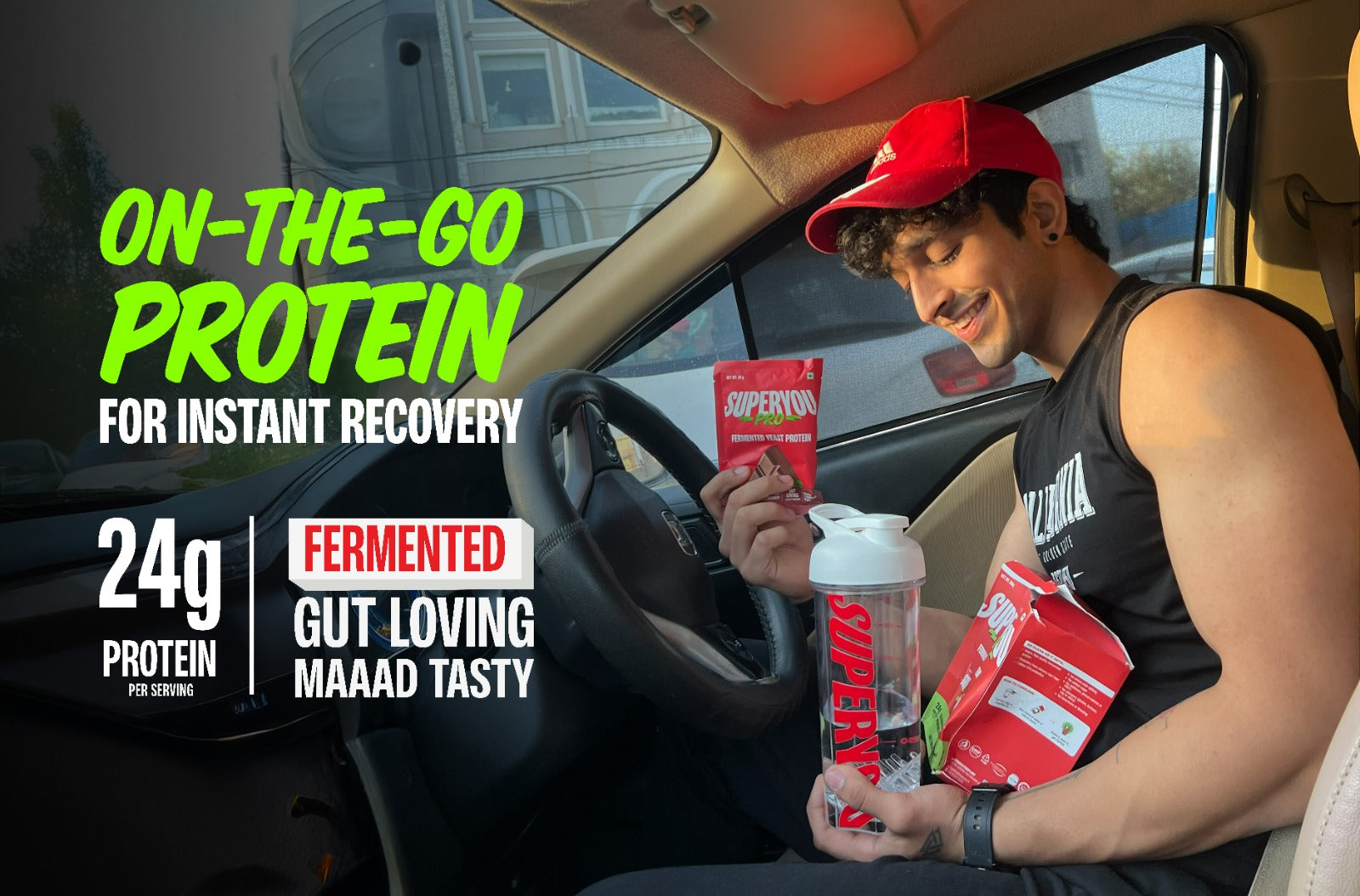Here's what elite performance nutrition has been missing: while athletes obsess over timing windows and leucine thresholds, sports scientists have been quietly perfecting something remarkable. Tucked away in precision fermentation labs, Saccharomyces cerevisiae, the same microorganism that powers beer brewing and bread rising, has been engineered to deliver athletic nutrition's holy grail: sustained amino acid release that matches your body's recovery demands, not supplement marketing claims.
Professional athletes consume protein like it's rocket fuel, downing whey shakes within minutes of finishing training sessions. However, here's the performance paradox: research shows that fast-digesting proteins, such as whey, create dramatic but brief amino acid spikes that last just 90 minutes, while muscle protein synthesis continues for up to 48-72 hours post-exercise. It's like trying to fuel a marathon with energy drink shots, powerful but painfully brief.
Fermented yeast protein changes this equation entirely, delivering what athletic performance actually demands: complete amino acid profiles released precisely when your muscles need them most.
The Athletic Protein Equation
Let's start with the numbers that matter. The International Society of Sports Nutrition confirms that athletes require 1.4-2.0 grams of protein per kilogram of bodyweight daily, with the upper range reserved for high-intensity training phases and periods of caloric restriction. For a 75kg athlete, that translates to 105-150 grams of protein daily, but quantity alone won't optimise performance.
Recent research demonstrates that leucine serves as the primary trigger for muscle protein synthesis, with elite athletes requiring approximately 2.5-3 grams per meal to maximise the anabolic response. But here's where conventional protein strategies fall short: most athletes rely heavily on whey protein, which delivers leucine in rapid bursts that quickly exceed the muscle's capacity to utilise amino acids effectively.
The branched-chain amino acids (BCAAs), leucine, isoleucine, and valine, comprise 35% of all essential amino acids in muscle tissue and play crucial roles in energy production during exercise. These aren't just building blocks; they're performance regulators that directly influence fatigue resistance, recovery speed, and adaptation to training stress.
This is where the protein conversation gets scientific.
The Three Protein Categories for Athletes
When evaluating protein sources for athletic performance, three distinct categories emerge:
Whey protein delivers rapid amino acid absorption within 1-2 hours, creating dramatic peaks in blood leucine levels. While effective for immediate post-exercise muscle protein synthesis, this rapid absorption leads to increased amino acid oxidation and shorter anabolic windows. Whey's speed becomes its limitation for sustained recovery.
Plant protein sources, such as pea and hemp, offer slower digestion rates but typically require larger servings to match the leucine content of animal protein. Plant proteins generally score lower on digestibility metrics due to anti-nutritional factors, requiring strategic combining to achieve complete amino acid profiles optimal for athletic performance.
Fermented yeast protein represents precision athletic nutrition: a complete protein derived from Saccharomyces cerevisiae that combines the amino acid quality of whey with sustained-release characteristics. Through controlled biofermentation, this creates a protein source engineered specifically for athletic demands rather than industrial convenience.
Why Fermented Yeast Protein Revolutionises Athletic Nutrition
The biofermentation process transforms simple yeast cells into athletic nutrition powerhouses. Fermented yeast protein achieves a Protein Digestibility-Corrected Amino Acid Score (PDCAAS) of 1.0, matching whey's gold standard whilst delivering fundamentally different absorption kinetics that align with athletic recovery patterns.
Fermented yeast protein contains approximately 7.5 grams of leucine per 100 grams of protein, comparable to whey protein but delivered through sustained release rather than rapid spikes. This matters because leucine threshold research shows that maintaining elevated leucine levels for extended periods optimises muscle protein synthesis duration.
What sets fermented yeast protein apart for athletes is its digestion profile. Research indicates that slow-digesting proteins maintain amino acid availability for 4-7 hours, providing sustained fuel for the extended recovery and adaptation processes that define athletic progression. Unlike whey's rapid peak-and-crash pattern, fermented yeast protein delivers a steady release of amino acids that matches muscle protein synthesis demands.
The BCAA profile is particularly notable for its applications in athletics. Fermented yeast protein contains approximately 18.62% total BCAAs, with optimal ratios of leucine, isoleucine, and valine. This BCAA density rivals that of whey protein while avoiding the digestive complications that can compromise training consistency.
The Performance Advantage
Here's where fermented yeast protein truly excels in enhancing athletic performance: improved digestive tolerance and sustained nutrient delivery. Studies show that BCAAs help reduce exercise-induced fatigue and improve endurance performance, with the key being consistent amino acid availability rather than dramatic concentration spikes.
The sustained release of amino acids serves multiple athletic functions. First, it maintains elevated muscle protein synthesis rates for extended periods, maximising the adaptive response to training stimuli. Second, it provides ongoing amino acid availability for energy production during prolonged training sessions. Third, it reduces the need for frequent protein intake timing, simplifying nutrition logistics for serious athletes.
Research demonstrates that slow-digesting proteins, such as fermented yeast protein, help prevent muscle breakdown during intense training phases while supporting enhanced recovery markers compared to rapid-absorption alternatives. The fermentation process also produces beneficial compounds that support gut health, crucial for athletes whose digestive systems face constant stress from high training loads and caloric demands.
Strategic Application: Making It Work
For athletes seeking performance optimisation, fermented yeast protein eliminates the guesswork around protein timing and absorption. Unlike fast-digesting proteins that require precise post-workout consumption windows, the sustained release characteristics of fermented yeast protein provide flexibility while maintaining efficacy.
Why It Works: The biofermentation process creates amino acid release patterns that mirror natural muscle protein synthesis rhythms. You're not dependent on split-second timing or multiple daily protein doses to maintain anabolic conditions. Single servings provide sustained amino acid availability, supporting both immediate recovery and long-term adaptation.
Consider the practical implications: a morning serving of fermented yeast protein provides amino acid coverage for 4-6 hours, supporting both pre-training amino acid availability and initial recovery phases. Studies show that athletes benefit from protein intake every 3-4 hours to optimise muscle protein synthesis, and fermented yeast protein's sustained release perfectly aligns with these recommendations.
The performance benefits extend beyond muscle protein synthesis. Research indicates that consistent BCAA availability improves lactate threshold and reduces perceived exertion during endurance exercise, making fermented yeast protein valuable for both strength and endurance athletes seeking competitive advantages.
Engineered for Athletic Excellence
The precision of fermented yeast protein production creates consistent athletic nutrition that traditional protein sources cannot match. Where whey protein varies based on seasonal milk composition and plant proteins fluctuate with growing conditions, biofermentation delivers identical amino acid profiles and absorption characteristics every single time.
Research confirms that fermented yeast protein exhibits superior digestibility and bioavailability, making it an ideal choice for athletes who wish to avoid digestive complications or inconsistent nutrient absorption during critical training phases.
SUPERYOU's commitment to fermented yeast protein represents the evolution of athletic nutrition, recognising that peak performance demands precision engineering, not approximation. When your goals include competitive advantage, rapid recovery, and sustained performance progression, you need protein technology that delivers on these demands without compromise.
Ready to experience sustained performance nutrition that works as hard as you do? Discover SUPERYOU's fermented yeast protein range and join the athletes who've found their competitive edge: one that fuels performance, enhances recovery, and supports the relentless pursuit of excellence.









